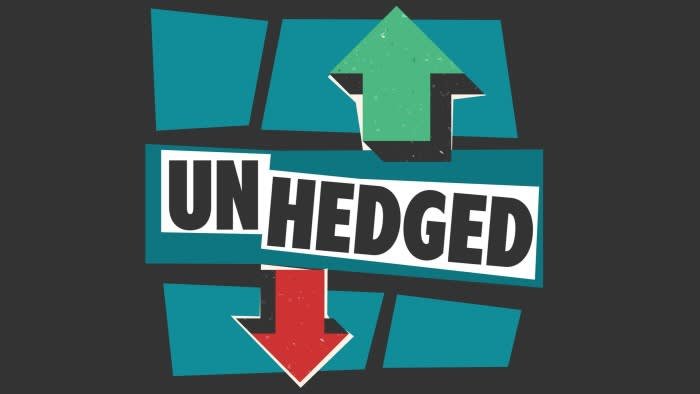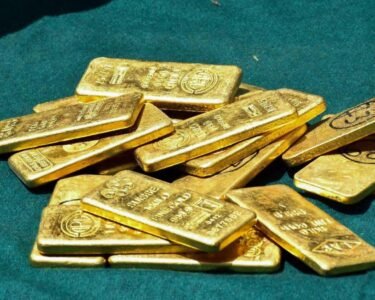This is an audio transcript of the Unhedged podcast episode: ‘The gold rally’
Katie Martin
Gold is one of those things in markets that really sparks an argument. Some people consider it to be a pointless pet rock, others as the only true store of value. The bickering about this is honestly endless. Either way, the shiny stuff is having a moment, with prices leaping up to the highest on record: around $2,500 an ounce. Today on the show, let’s settle this once and for all. Is gold just for weirdos? (Robert laughs) That’s the question, though.
Robert Armstrong
Yes, that is fair. That’s totally fair, Katie. And like certain other asset classes, gold does bring out the weirdos. However . . .
Katie Martin
Wait a minute, wait a minute. I need to do that “This is Unhedged” bit.
Robert Armstrong
OK. Do it.
[MUSIC PLAYING]
Katie Martin
This is Unhedged, the markets and finance podcast from the Financial Times and Pushkin. I’m Katie Martin, a markets columnist here at the FT in London, and I’m pretty firmly in the camp that gold is like annoying, but by the magic of modern technology I’m joined down the line from New York by my esteemed associate Rob Armstrong, captain of the Unhedged newsletter, and somehow now kind of gold curious. I mean, Rob, are you? . . .
Robert Armstrong
Yes. That’s how I would describe it. I agree with you, Katie, that gold brings out the conspiratorial, tin hat-wearing types in the world. However, just because you’re paranoid doesn’t mean the world is not out to get you. In other words, there is a case to be made that the sort of odd people who tell us we’re foolish to own stocks or government bonds have their money in ingots in a safety deposit box or hidden in their house may be on to something. This year, the value of the stuff has gone up more than stocks. So who’s the weirdo now, Katie? That’s what I’m asking you.
Katie Martin
I mean, yeah, the tinfoil hat crew are doing, like, really no idea of this trade now, but why are people so attached to this as a thing to invest in?
Robert Armstrong
I think there is a constituency in markets that really distrusts government in general and central banks in particular. So the government is irresponsible in that it borrows all this money and props up the economy at the wrong times and so forth and the central bank is irresponsible in that it prints all this money. And there are people, I mean, rightly so, who want to be in an asset that is safe from those real or perceived manipulations. And gold being a very, very ancient store of value and one where the supply cannot be controlled by governments, or at least not controlled very well, it’s an asset that sort of fits the bill.
Katie Martin
There’s a whole set of questions there, right, around is it actually an asset? Is it a currency? I mean, good luck buying a six pack of beer with it down in the supermarket. So from that point of view, I’m gonna say no.
Robert Armstrong
Here’s one way to think about it. It’s not a very reliable currency. So between about, like just for a recent example, between about late 2011 and late 2018, the value was just down to flat. It depreciated. You lost buying power. And that’s a fairly long time. That’s six or seven years when your so-called currency is doing nothing for you, right, or less than nothing for you.
But one characteristic of gold which justifies the people who are real partisans is that when the poop really hits the fan, when the market is in real crisis — 2001, 2008, the end of 2018, those first scary moments of Covid — gold really does tend to hold its value, and indeed it generally appreciates. So when people are panicked and they’ve given up on rationality and the future looks very dim, gold does shine. So that’s a characteristic you might want in a portfolio.
Katie Martin
OK. Is the current environment really that bleak? Like gold has had a great run this year. Like I say, it’s up in nominal terms at least to close to a record level. I don’t see a pandemic. I mean, you can certainly point to parts of the world that have got hideous geopolitical situations going on, but it’s not like we’re on the brink of World War Three I don’t think, unless there’s something that these people know that I don’t. Like I just don’t get that the current environment is bad enough to justify what’s going on with the gold price.
Robert Armstrong
First of all, you’re absolutely right. Gold is going bananas right now, at a moment that doesn’t look like the moments when it traditionally goes bananas. There is still growth. There is anything other than panic in risk asset markets. We have the kind of the opposite of panic. But there are some things that help explain why gold would do well right now. So one of them is slightly technical and boring, but I’m gonna risk saying it anyway.
Katie Martin
(Laughter) That’s what the listeners tune in for.
Robert Armstrong
(Laughter) This is what they like.
Katie Martin
Give them what they want.
Robert Armstrong
So now, this involves the real rate of interest, that is, the rate of interest you can get in the market on your bonds or whatever, your 10-year bond, minus the inflation rate. And when that is positive, when the bond rate minus inflation is a positive number, that means you can make some money, real money, inflation-adjusted money, just sitting around doing nothing. And when that number is high, gold does badly because gold, you’re sitting around doing nothing and you don’t even get that real interest.
So it’s when gold tends to do its best is when the real rate of interest is negative. In other words, sitting around in bonds, you’re actually getting poorer in real terms. Why not own gold? At least it’s stable. Anyway, right now, the real rate of interest in anticipation of Federal Reserve interest rate cuts is falling. And that is part of the story on gold.
Katie Martin
Yeah. So, you know, if you’re getting effectively less and less money in terms of the regular interest payments on your bonds, then you may as well . . .
Robert Armstrong
Less and less real money.
Katie Martin
Exactly. Then you may as well own gold instead, because it’s really important to remember gold doesn’t pay you a dividend, doesn’t pay you any kind of interest. You just own the pet rock or some sort of financial instrument that reflects the price of the pet rock in the wholesale markets. The thing is, I think this is why I find gold irritating, is that every argument you can construct, why it’s doing well right now, whether it is something around the kind of geopolitical situation or around the real interest rate or anything like that, you can immediately unpick it, right? So there’s a kind of an equally valid counterargument to any of these points. But there do seem to be some big picture shifts going on that are supportive for the gold price at the moment. And I’m thinking here of central bank reserves and of China. Which one of them do you want to pick first?
Robert Armstrong
OK. Central bank reserves. Russia starts a war, right, and this is considered extremely bad manners by most people and we’re against it. And so quite rightly, the American authorities are interested in punishing Russia for their monstrous behaviour and they target Russia’s dollar reserves, right, and they make it harder for Russia to transact in dollars on the global marketplace. This is a thing that I strongly approve of. However, central banks around the world say, we’re keeping all of our extra money in US dollars. And as it turns out, if we do things the US doesn’t like, they’re gonna make our life difficult. Maybe we should put some of our reserves — just a little bit. People still love dollars don’t think that. This is not a wholesale change. This is at the margin. But central banks are starting to think maybe at the margin it might be wise to have some non-dollar assets.
Katie Martin
What, just in case we accidentally invade another country in a war of aggression.
Robert Armstrong
Yes. Just in case that should happen.
Katie Martin
You’re showing your hand here a bit, guys.
Robert Armstrong
(Laughter) In any case, your options there aren’t great. You wanna own euros? Shall we have a little discussion of the history of the euro as a store of value? You wanna own the Chinese currency?
Katie Martin
But also, same problem, right? Yeah, yeah.
Robert Armstrong
Yeah. So gold starts to be appealing. And in the recent year or two, central banks have increased their purchase of gold. And because gold is relatively scarce, a relatively small change in demand can actually move the price quite a lot. So in the longer gold run that started kind of 2018, 2019, central bank purchasing has played a role.
Katie Martin
It’s a factor. Yeah, yeah.
Robert Armstrong
China’s a different case. Traditionally, a very big source of demand for gold is people in China and by the way in India who do use this stuff as a store of value, and a lot of it is actually just owned as jewellery. Right now in China, as you may know and as we have discussed on this show in previous episodes, I believe the real estate market, which is the traditional place for Chinese households to put their savings, is doing terribly. So if you are a Chinese household, you used to use your extra money to buy an extra apartment that you gave to your kids or rented out. Now what are you gonna buy? So under those circumstances gold demand in China up until recently, and we’ll talk about that recently shortly, has really gone up. And we saw some of the same in India as well.
Katie Martin
OK. So maybe, what if it’s not really a currency and it’s not really a kind of asset as such, but it’s like a commodity, because you can kind of think about it in any of those ways, right?
Robert Armstrong
Yes.
Katie Martin
Again, one of the reasons that irritates me is that it’s not a normal commodity. It’s not really pushed around by supply and demand. It’s not like someone’s found a new industrial use case for gold and it’s going to like, power the green energy revolution. We’re not gonna be putting it in any wind turbines any time soon.
Robert Armstrong
There are industrial uses for it. But it’s something, it’s like 6 per cent of demand for gold, something like that. It’s there. And maybe it puts a floor at the very bottom under the price, but it’s not a big deal. Industrial use is not gonna drive a huge rally in this stuff. So it is a unique asset. It is not a commodity. As you can see right now, other commodities are doing awful right now while gold is rallying. It is not a commodity. It is not a currency. It is its own thing. It’s like this panic button that you press when you think governments are behaving, governments and central banks are behaving irresponsibly or otherwise, war, economic collapse, things have gone very badly pear-shaped. It is strange, as you point out, that it has rallied so strongly now when things seem broadly OK, but . . .
Katie Martin
Yeah, inflation is coming down.
Robert Armstrong
It speaks to kind of specific, very specific cracks in the world economy rather than big horrible ones, I guess. But let me say this, Katie. The people who buy gold when they’re scared are actually price sensitive. The rule of thumb used to be at around like $2,000 or $2,100. And there has been strong evidence that at 2,500 bucks, the Asian retail demand has really weakened because they just figure, heh, we’ll try, you know, we’ll try again in a couple of weeks maybe or a couple of months or a couple of years, and maybe we’ll buy the same stuff for $2,000 an ounce.
Katie Martin
I enjoyed that little noise, that heh. (Laughter)
Robert Armstrong
Heh. Yeah. That’s the sound of rationality. Heh! (Laughter)
Katie Martin
That’s the majesty of the capital allocation process in action. But you know what this all sort of sounds a lot like? Bitcoin.
Robert Armstrong
Oh it’s horrible. I knew you were gonna say that.
Katie Martin
Someone referred to it recently in a note that I received as gold is physical bitcoin. And you know what I did with that note that I received? I deleted it immediately in a mood.
Robert Armstrong
You should have printed it out only to shred it.
Katie Martin
If I could figure out how to use the printers around here, I would.
Robert Armstrong
I mean, the analogies are frightening, right? So both gold and bitcoin are basically valuable because people think they’re valuable.
Katie Martin
Yes. It goes up when other people think it’s gonna go up.
Robert Armstrong
If everybody in the world just decided gold was boring and uninteresting and didn’t work any more, it would be boring and uninteresting and it wouldn’t work any more, right? Ditto with bitcoin. You know, it is what it is because people believe what it is. Did I get that right? It is what it is because people believe it is what it is. In any case, there’s a huge element of faith in both. They’re both wildly expensive and environmentally destructive to produce, right? You know, in the case of gold, you have to dig this huge hole in a perfectly innocent piece of ground and then leach the gold from it using wretched chemicals and so forth. And, you know, it’s . . . And then with bitcoin . . .
Katie Martin
On that note, actually, that’s something I wanted to ask you, is like the gold miners. If you look at gold mining stocks, they’re not doing anything anywhere close to as exciting as what the gold price is doing. So again, that sort of says to me that like, gold is going up because gold is going up and soon it will go down again because it’s going down. And it’s probably not worth wasting too much intellectual effort on figuring out why. So this whole thing has been a total waste of time, Rob.
Robert Armstrong
Well, there’s a very straightforward reason that the gold miners have done so badly in recent years and like the last 10, 15 years. And that is because gold miners are operated by miners, and miners are people. What they really like to do is dig huge holes in the ground and find things. They just love doing that.
What they don’t like doing is making investors richer. If you give a miner, whether it’s a copper miner or a coal miner or a gold miner, an extra dollar, the guy immediately says — and it usually is a guy — great, I can dig another dollar’s worth of hole in the ground. And his investors are like, but we wanted that dollar. And he’s like, tough, digging more holes. And usually there’s nothing at the bottom of the hole and it’s a disaster.
So every once in a while miners kind of get religion and sort of think, what if we make money instead of more holes? Like this happened in the shale industry in the United States, where shale operators instead of drilling holes in random places in the United States decided to just pull oil from the all the holes they had and give the money to their investors. And lo and behold, the stocks went up a lot. So there is a, it’s a classic kind of agent-principal problem with gold miners. And it will not surprise you to hear that the gold miners say they are going to stop doing this now and they are going to give investors a lot of free cash flow instead of a lot of holes. But we will see.
Katie Martin
Now, the thing is, Rob, as you will no doubt be aware, if you make the mistake of writing or talking about gold in a public forum, you receive emails from people who do not like you very much.
Robert Armstrong
At katie.martin@ft.com, where all of your correspondence from this podcast should go.
Katie Martin
(Laughter) So I would just like to put on record that any listeners out there that have called this gold move correctly and have made a lot of money out of it, (inaudible).
Robert Armstrong
Keep it to yourself. (Laughter) Hats off to you.
Katie Martin
Hats off to you. Like, it’s been an incredible run. It was a trade that no one saw coming this year. I think it was a couple of asset managers that had it on. But like, you know, if you’ve ridden this, then you’ve done incredibly well and just . . . I would claim to be clever rather than lucky if I were you. But pick any reason why it’s clever and stick with it and just fantastic. But what I wanna ask you, what I really wanna do, Rob, is give you the opportunity to be wrong about this again. So tell me.
Robert Armstrong
That’s my specialty.
Katie Martin
(Laughter) What you do best. By the end of this year, will gold be at $3,000 an ounce, $2,500?
Robert Armstrong
I’m going to say we’re not gonna get to 3,000 this year for the simple-minded reason that retail buyers and even central bank buyers are price-sensitive and they’re gonna look at the shape of the gold chart and say, this looks a little too hot to handle.
Katie Martin
I think it will. I think they’ll say to this, ngeh, ngeh.
Robert Armstrong
I bet I can come back in 2025 . . . Meh! Meh. And they’ll give it the meh and then . . . So I think, you know, it’s been a great run. I wouldn’t wanna say it’s gonna stop here, but if I had to guess, we’re not gonna get to 3,000 in 2024.
Katie Martin
Maybe. OK. But what about a year from now and then I will just stop moving (overlapping speech)?
Robert Armstrong
No, I answered one question and I think that’s . . .
Katie Martin
(Laughter) I’ve answered all your questions, now leave me alone.
Robert Armstrong
You’re just gonna keep asking me questions until I give an answer that turns out to be wrong, which you can remind me about later. This is not fair.
[MUSIC PLAYING]
Katie Martin
Good stuff. I think we’ve definitely, we’ve tortured this theme to death. So we’ll leave it there. But we’re gonna be back in a sec with Long/Short.
[MUSIC PLAYING]
Okie-doke, now it’s time for Long/Short, that part of the show where we go long a thing we love or short a thing we hate. Rob, what you got?
Robert Armstrong
Well, you know, Katie, tomorrow on Wednesday, we have the most important earnings report in the world.
Katie Martin
Dun-dun-dun.
Robert Armstrong
So Nvidia, a little chip company that also happens to be the most valuable company in the world and the figurehead of the AI hype cycle in the entire stock market, reports Wednesday afternoon. And of course, if it’s good, the whole market is gonna go up and if it’s bad, the whole market is gonna go down.
Katie Martin
Which, by the way, is a ridiculous situation that we find ourselves in. It is nonetheless true.
Robert Armstrong
A preposterous way to run a stock market. Absolutely right. However, I feel it is incumbent upon us to predict for our audience whether these earnings are going to be a pleasant surprise or an unwelcome disappointment. And I am taking the pleasant surprise. It’s just a coin flip. I have no inside information here, but I’m generally an optimist so I’m gonna say Nvidia is gonna be OK. Are you joining me on the long side of this one, Katie?
Katie Martin
You’re long optimism and you are long gold. This is an interesting position to be holding. I’m gonna say I’m gonna be a little pessimistic on Nvidia in terms of how its stock performs only because it’s had such a blowout run. I mean, I’ve never seen anything like it. It’s added what, $3tn in market value over the course of this year or something stupid like that. Don’t quote me on the numbers. It’s a lot of money. So I’m gonna say the scale of disappointment that Nvidia would have to put out to knock its stock a little bit would be really quite small. So on that basis, I will go short and one way or another, one of us will be wrong by next time we chat.
[MUSIC PLAYING]
Robert Armstrong
That’s it. That’s what we’re always looking for.
Katie Martin
Perfect. OK, listeners. So that’s it for now. But we’re gonna be back on Thursday, so listen up then.
Unhedged is produced by Jake Harper and edited by Bryant Urstadt. Our executive producer is Jacob Goldstein. We had additional help from Topher Forhecz. Cheryl Brumley is the FT’s global head of audio. Special thanks to Laura Clarke, Alastair Mackie, Gretta Cohn and Natalie Sadler.
FT premium subscribers can get the Unhedged newsletter for free. A 30-day free trial is available to everyone else. Just go to ft.com/unhedgedoffer.
I’m Katie Martin. Thanks for listening.
[MUSIC PLAYING]




